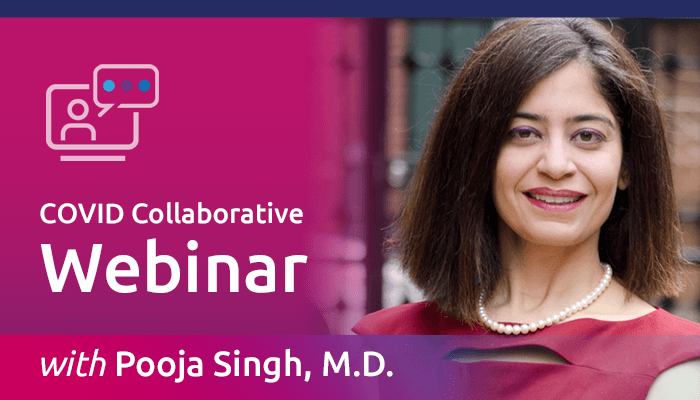Collaboration during COVID-19 means donation and transplant professionals sharing resources and working together. With this priority in mind, the Organ Procurement and Transplantation Network launched the COVID Collaborative in late April. The secure online platform is a virtual workspace for members to engage with one another, ask and answer questions, and contribute by sharing their own resources and effective practices.*

Pooja Singh, M.D.
The Collaborative’s first webinar, “Telemedicine, transplant, and COVID-19: One transplant center’s experience,” featured Pooja Singh, M.D., who offered her perspectives on the potential benefits and challenges involved with telemedicine — an approach to care delivery that, given COVID-19, has become increasingly important.
In a recent interview, Singh offered additional thoughts on the OPTN COVID Collaborative, the effective practices she was driven to share, and what transplant topics she would like to hear about from other members during this time.
Q: The OPTN COVID Collaborative launched in April, only a few weeks after the World Health Organization declared COVID-19 a pandemic. What does this type of collaboration mean to transplant at a time like this?
A: I feel this is a wonderful initiative — there is no precedent for this. This is new territory for all of us. When has the community come together in such a crisis? We have to consider that transplants almost came to a standstill across the country, including in Philadelphia, where Jefferson is located. While some areas like New York have clearly been impacted to a much greater extent than others, all regions and programs have been affected. The OPTN COVID Collaborative has given us a forum to really come together. We are all trying to help each other and learn lessons from this, because COVID-19 will be around for the foreseeable future. As transplant hospitals begin to perform transplant surgery again, they will look to one another to learn.
Q: How is the community approaching living donation right now?
A: It’s exciting that the data is showing that living donor transplants have started again across the country. With living donor transplantation during COVID-19, we have to consider both the donor and the recipient in terms of safety. We are all looking at ways to begin performing these surgeries again with donor and recipient safety as our top priority as we work to save lives through transplant. And we are looking to each other to learn how to get the many logistical and operational considerations in a place to start. Everyone is sharing their practices and protocols so we can learn from one another across departments, divisions, and institutions.
Q: What drove you to present your webinar on telemedicine for the OPTN COVID Collaborative?
A: Telemedicine is a huge topic in the current moment, but not all programs have the same familiarity with it or access to a user-friendly telemedicine platform. Telehealth is not just technology — it’s about workflows and operations. In 2016, our team at Jefferson Transplant Institute adopted and evolved a telemedicine program as an approach to providing virtual pre-transplant evaluations, living donor evaluations, and other physician and patient interactions. I wanted to share our experience because I knew it would be valuable to others who are currently expanding their telemedicine practices as a result of COVID-19.
Q: What telemedicine topics did you cover in your webinar?
A: I discussed a range of topics, one of the most important being the recent consumer willingness to try new models of care delivery. People want telemedicine now as they continue to avoid potential risk. This COVID-19 pandemic has triggered removal of some traditional boundaries to care delivery, resulting in expansion of access to health care. I also shared information about insurance coverage and rules regarding practicing telehealth across state lines and of course, how to develop workflows for transplant and post-transplant evaluations post-COVID-19.
Q: What COVID-19-related topics would you like to hear more about from your transplant peers?
A: There are two areas I would really be interested in hearing more about — the first is living donor transplant. I would like to hear from other programs, especially those in other regions, about what they are experiencing, and what considerations they are taking into account in terms of beginning living donor transplants again. The second is waiting list maintenance during the COVID-19 pandemic. Patients are looking for information about antibody testing, among other things. I would appreciate learning how are other programs are guiding patients in regard to antibody testing and other patient questions.
*Effective July 10, 2020, the OPTN COVID Collaborative inactivated. Read the details.
Pooja Singh currently serves as the Region 2 representative on the OPTN Living Donor Committee, and in June will begin a one year term on the American Society of Transplantation’s Audit Committee. Her interests include removing barriers to living donation, waitlist maintenance, management of failing renal allografts and telemedicine. She is pursuing an MBA and expects to receive her degree in May of next year.

